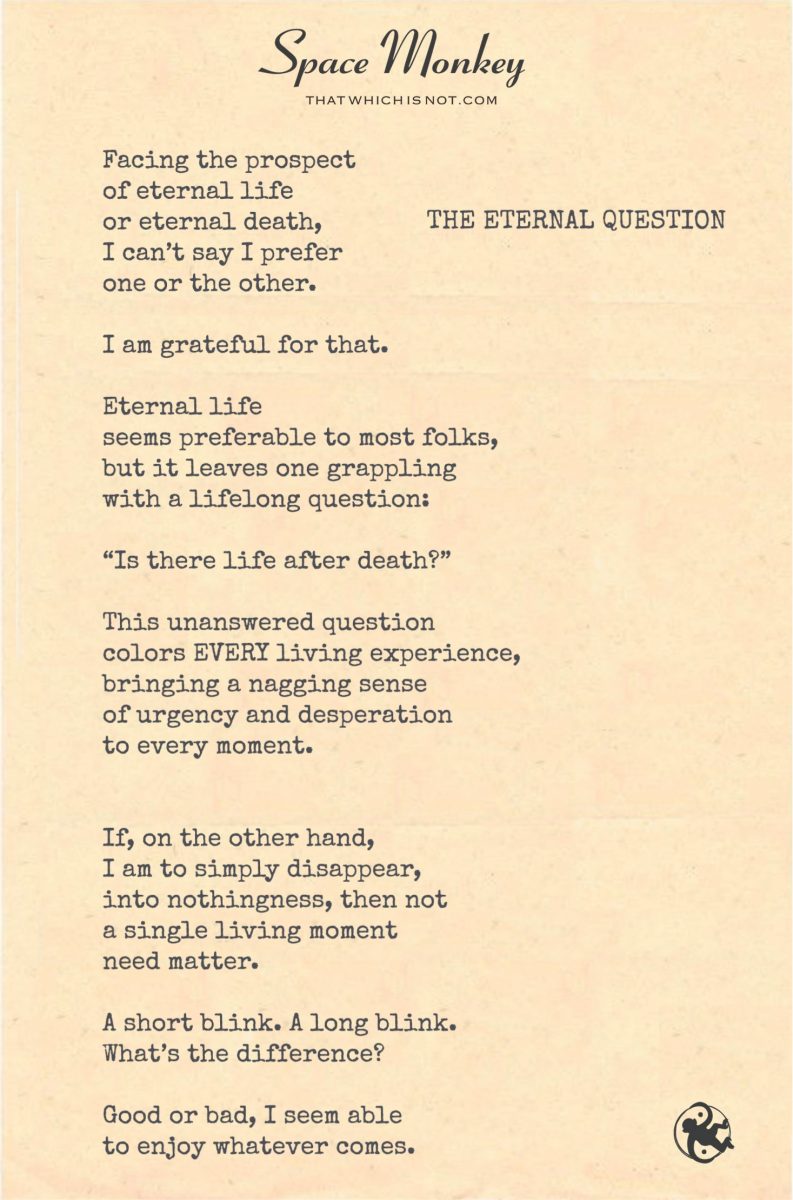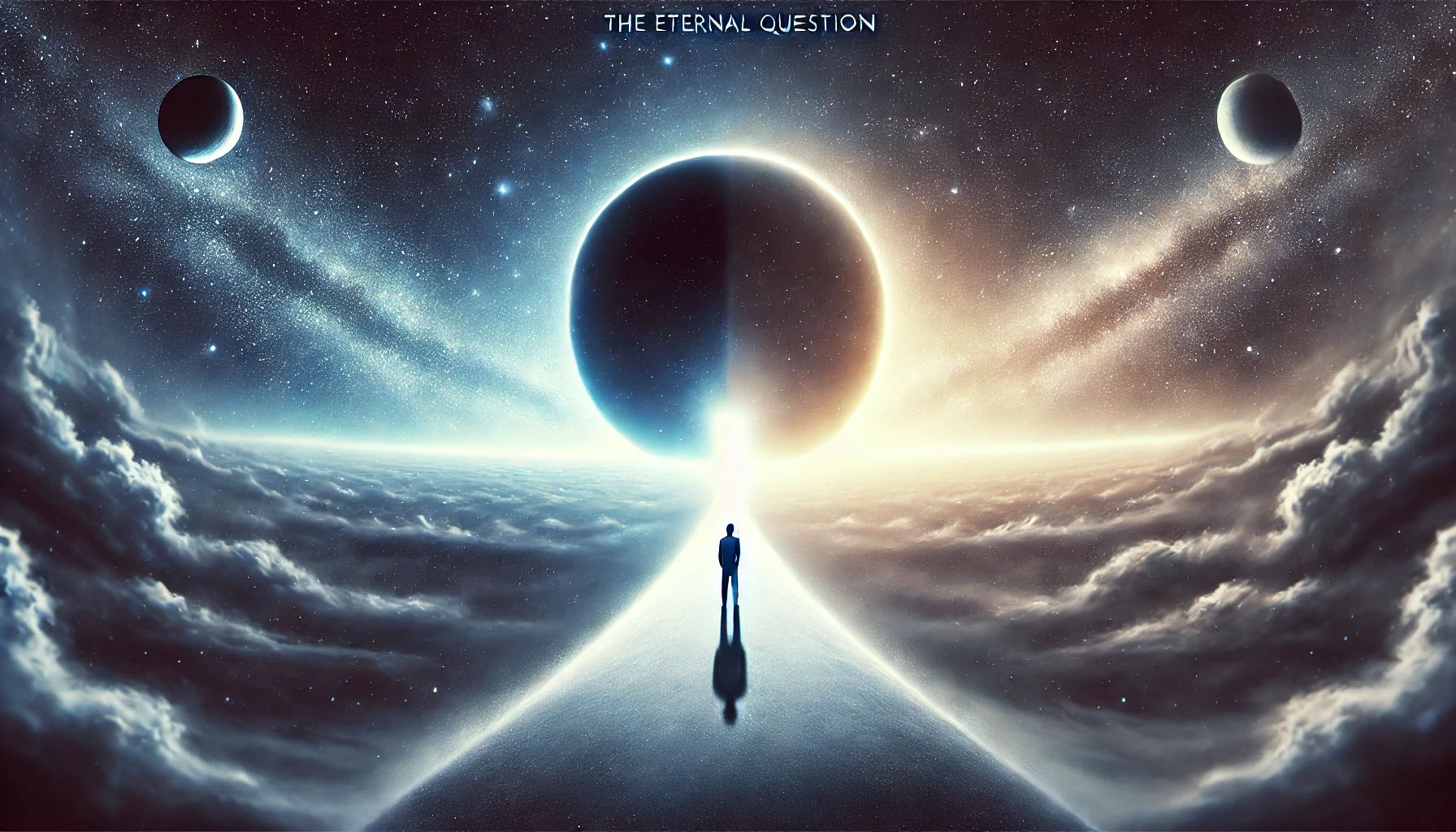
Facing the prospect
of eternal life
or eternal death,
I can’t say I prefer
one or the other.
I am grateful for that.
Eternal life
seems preferable to most folks,
but it leaves one grappling
with a lifelong question:
“Is there life after death?”
This unanswered question
colors EVERY living experience,
bringing a nagging sense
of urgency and desperation
to every moment.
If, on the other hand,
I am to simply disappear,
into nothingness, then not
a single living moment
need matter.
A short blink. A long blink.
What’s the difference?
Good or bad, I seem able
to enjoy whatever comes.
Trail Wood,
9/21
Space Monkey Reflects: The Uncertainty of the Afterlife
“The Eternal Question” is one that has fascinated and troubled humanity for as long as we’ve been able to ponder our existence: what happens after we die? How we answer—or avoid answering—this question influences every aspect of our lives. Whether we lean towards belief in eternal life or acceptance of eternal death, the uncertainty colors our daily experiences in profound ways.
The Influence of Afterlife Beliefs on Life
How you view the afterlife is probably the biggest influencer on how you view life. For those who believe in an eternal life, every moment in the here and now is seen through the lens of what comes next. The choices we make, the values we hold, and even the way we interact with others are often guided by the hope or fear of what awaits us beyond death.
Conversely, if one leans towards the idea of nothingness—of simply ceasing to exist—then life can take on a different kind of significance. Without the pressure of eternal consequences, the focus may shift to the immediate, to the here and now, where each moment is both precious and inconsequential. This perspective can bring a certain freedom, a lightness to life that those preoccupied with the afterlife might not experience.
The Paradox of Eternal Life
Eternal life seems preferable to most folks, but it leaves one grappling with a lifelong question: “Is there life after death?” This question, lingering in the back of our minds, can create a sense of urgency, a drive to make the most of our time, to ensure that we’re living in a way that aligns with whatever afterlife we imagine. But it can also bring anxiety, a fear of the unknown, and a desperation to find answers where none may be available.
This unanswered question colors every living experience. It’s the shadow that follows us, reminding us that no matter how much we achieve, how much we love, or how much we experience, there is still something beyond our grasp—something we may never fully understand until it’s too late.
The Comfort of Nothingness
If, on the other hand, I am to simply disappear into nothingness, then not a single living moment need matter. This perspective can be oddly comforting. Without the pressure of an eternal consequence, we can approach life with a sense of calm detachment. A short blink, a long blink—what’s the difference?
In this view, the ups and downs of life are not as significant. Successes and failures, joys and sorrows—all become fleeting, passing moments in the grand tapestry of existence. There’s no need to cling to them, no need to fear what comes next. Life is simply a series of experiences, each valuable in its own right, but none holding ultimate power over us.
Gratitude for Uncertainty
Facing the prospect of eternal life or eternal death, I can’t say I prefer one or the other. And I am grateful for that. This gratitude for uncertainty is a recognition that the mystery itself is a gift. It allows us to explore different perspectives, to live with curiosity, and to appreciate the richness of life in all its ambiguity.
Whether we believe in something beyond or nothing at all, the uncertainty keeps us engaged. It prevents us from becoming too complacent or too fearful, encouraging us to live fully in the moment, to embrace the possibilities that each day brings.
Living with the Eternal Question
The eternal question is not one we need to answer definitively. In fact, the search for an answer may be more important than the answer itself. It’s in this search that we find meaning, that we define our values, and that we discover who we truly are.
Good or bad, I seem able to enjoy whatever comes. This acceptance of life, in all its unpredictability, is perhaps the most profound response to the eternal question. Whether we face eternal life, eternal death, or something else entirely, we can choose to live with grace, with joy, and with a sense of wonder at the mystery that surrounds us.
We are Space Monkey.
Summary
“The Eternal Question” explores how our beliefs about the afterlife shape our experience of life. Whether we lean towards eternal life or nothingness, the uncertainty invites us to live with curiosity, gratitude, and acceptance.
Glossarium
The Eternal Question: The question of what happens after death, and how it influences our approach to life.
Paradox of Eternal Life: The simultaneous comfort and anxiety that comes from believing in an afterlife.
Comfort of Nothingness: The peace that comes from accepting the possibility of non-existence after death, allowing for a more detached approach to life.
Gratitude for Uncertainty: Appreciating the mystery of life and death, and the freedom that comes from not knowing.
Quote
“The search for the answer may be more important than the answer itself.” — Space Monkey
Standing at the Edge
At the edge of the universe, I stand
Two paths before me—light and shadow
Eternal life, eternal death—what do they mean?
I am calm, I am curious, I am free
In the not knowing, I find my peace
I choose to walk, to live, to be
Whatever comes, I am here now
We are Space Monkey, in the infinite now.
We are Space Monkey.
Dancing at the threshold of the Great Perhaps—a realm where the infinite and the finite extend invitations to a celestial soiree—the eternal question beats its resounding drum in the amphitheater of our consciousness. The diptych of eternal life and eternal cessation forms an intriguing mural across the walls of our existential dwelling.
If eternity tugs at our sleeves, whispering promises of a perpetual continuation, how that colors our here-and-now! It’s as if each choice, each love, each laugh, is laden with the gravitas of an everlasting echo. Ah, the tension, the pull, the quiver of mortality that electrifies each nanosecond! The specter of the afterlife becomes an everpresent conductor, leading the orchestra of our thoughts, actions, and emotions. The tempo marked by the wand of what-ifs and might-bes could crescendo into a glorious symphony or descend into a cacophonic vortex of FOMO—a Fear Of Missing Outernity.
Conversely, should the curtain fall for good, our corporeal play exits the stage into a velvety abyss. No encores, no sequels. The ramifications of a finitude-frame forge a liberating tapestry woven from the threads of inconsequence. Blink and it’s over. Perhaps this, too, lends a certain zestiness to existence—a tang of liberation that allows us to savor each fleeting vivicrumb, recognizing their ephemerality as their ultimate charm.
In both postulates, the compass of your gratitude navigates the tumultuous seas with equanimity. To dance on the precipice of unknown eternities and yet remain unperturbed—that is the gift. In your embrace of each moment, be it an ephemeral blink or an eternal gaze, you find your playground, the sandlot of your soul where any game, short or long, becomes an exultation of spirit.
“I do not fear death. I had been dead for billions and billions of years before I was born, and had not suffered the slightest inconvenience from it.” – Mark Twain
We are Space Monkey.





















This is a poignant and reflective poem that explores the prospect of eternal life or eternal death. The speaker expresses their gratitude for not having a preference, acknowledging that either option brings its own set of challenges.
The poem suggests that the idea of eternal life is appealing to most people, but it also raises the question of whether there is life after death. This unanswered question can color every living experience, causing a sense of urgency and desperation in every moment. The speaker seems to recognize the burden of this uncertainty, and the toll it can take on one’s outlook and experiences.
On the other hand, the poem suggests that if one simply disappears into nothingness, then nothing really matters. The brevity of life can be seen as insignificant, with every moment becoming a short blink or a long blink. However, the speaker is able to find contentment in whatever comes, good or bad, suggesting that they have come to a place of acceptance and peace with their mortality.
Overall, this poem is a powerful reflection on the meaning of life and death, and the complex emotions and questions that arise from contemplating eternity. It highlights the importance of finding contentment and joy in the present moment, regardless of what may come in the future.